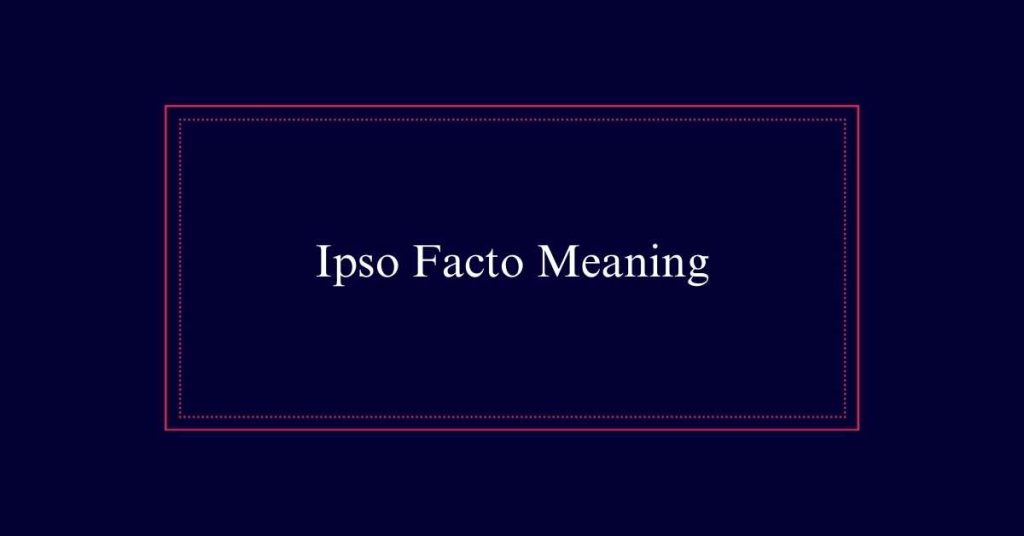Ipso Facto Meaning
The term ‘ipso facto’ is a Latin phrase that means ‘by the fact itself.’ It describes a situation where a specific fact or action inherently leads to a direct consequence. This term emphasizes automatic outcomes without needing further explanation. It is frequently used in legal contexts to indicate consequences that arise naturally from a situation, such as in cases of bankruptcy or breach of contract. ‘Ipso facto’ highlights logical relationships and simplifies complex ideas.
Definition of Ipso Facto
The term ‘ipso facto’ is a Latin phrase that translates to ‘by the fact itself.’ It implies a direct consequence of a specific fact or action.
For instance, if someone is walking a pilgrim route, they are, ipso facto, a pilgrim. The phrase indicates an inherent result without needing further explanation. It can be used before or after the word it modifies, adding flexibility in sentence structure.
While there are context-dependent alternatives like ‘hence’ or ‘thus,’ these are not always interchangeable. The unique nature of ‘ipso facto’ makes it valuable in English, as it succinctly conveys an automatic consequence derived from the stated fact.
Etymology of Ipso Facto
Understanding the origins of the phrase ‘ipso facto’ provides insight into its continued relevance in modern language.
The term is derived from Latin, a language that has greatly influenced English vocabulary, especially in legal, scientific, and philosophical contexts. Ipso’ is a reflexive pronoun meaning ‘itself,’ and ‘facto’ comes from ‘facere,’ meaning ‘to do’ or ‘to make.
Key points about its etymology include:
- Latin Roots: It combines two Latin words, indicating its deep historical roots.
- Classical Usage: It was used in classical texts to denote direct consequence.
- Modern Adoption: Its usage persists in contemporary English, particularly in formal writing and legal documents.

Literal Translation
Examining the literal translation of ‘ipso facto’ reveals its straightforward meaning: ‘by the fact itself.’
This Latin phrase is composed of two parts: ‘ipso,’ a reflexive pronoun meaning ‘itself,’ and ‘facto,’ meaning ‘fact’ or ‘deed.’ Together, they succinctly convey the idea that something is a direct consequence of a particular fact or action.
In English, ‘ipso facto’ is used to highlight that an outcome is inherent or automatic due to the existing facts. The phrase’s clarity and precision eliminate the need for additional explanation, making it a valuable tool in both written and spoken language.
Usage in Legal Contexts
In legal contexts, ‘ipso facto’ denotes consequences that arise automatically from a fact or action. This term is frequently used to indicate outcomes that occur by the very nature of a situation. It is crucial for legal professionals to understand its implications.
Here are three ways ‘ipso facto’ is applied in legal settings:
- Bankruptcy: A person declared bankrupt ipso facto loses control over their finances.
- Contracts: Breach of contract ipso facto leads to certain penalties without further action needed.
- Corporate Law: A director involved in fraud may ipso facto be disqualified from holding a directorial position.
Usage in Everyday Language
The phrase ‘ipso facto’ is often employed in everyday language to emphasize that a certain result directly follows from a specific fact or action. This Latin term is used to stress a logical consequence without needing further explanation. Its application is broad and versatile, making it useful in various contexts, from casual conversations to more formal discussions. Understanding its usage can enhance clarity in communication. Below is a table highlighting common scenarios where ‘ipso facto’ might be used.
| Context | Example Phrase | Explanation |
|---|---|---|
| Education | “A student, ipso facto, must study.” | Direct consequence of being a student. |
| Business | “He owns shares, ipso facto, he’s a shareholder.” | Ownership implies shareholder status. |
| Legal | “Violation, ipso facto, leads to penalties.” | Direct result of a violation. |
| Daily Life | “It’s raining, ipso facto, it’s wet.” | Rain inherently makes things wet. |
| Technology | “Using a computer, ipso facto, involves typing.” | Direct consequence of computer use. |
Examples of Ipso Facto
Ipso facto is frequently used to highlight the immediate consequence of a fact or action in various contexts. For example, in legal terms, if someone is found guilty of theft, they are ipso facto considered a criminal. This phrase underscores the direct result without needing additional explanation.
Here are three examples to illustrate its use:
- Law: A person who commits fraud is ipso facto untrustworthy.
- Religion: By attending church regularly, one is ipso facto a member of that congregation.
- Education: A student who submits plagiarized work is ipso facto guilty of academic dishonesty.
Synonyms and Alternatives
Finding exact synonyms for ipso facto is challenging due to its unique implications.
The phrase means ‘by the fact itself,’ which directly links an action to its consequence.
While there are no perfect single-word equivalents in English, context-dependent alternatives can be used. Words like ‘thus,’ ‘hence,’ or ‘thus’ can sometimes convey a similar idea. However, these alternatives may require rearranging the sentence to fit properly.
For example, ‘He was absent, ipso facto, he missed the meeting’ could be rephrased as ‘He was absent; thus, he missed the meeting.’
Despite these alternatives, ipso facto maintains a distinctive usage in English, emphasizing the directness of the relationship between cause and effect.
Limitations of Synonyms
While alternatives like ‘thus’ or ‘hence’ exist, they often fail to capture the full nuance of ipso facto. This Latin phrase inherently carries a precise, immediate causality that simpler English words lack.
Here are three key limitations of using synonyms instead of ipso facto:
- Loss of Precision: ‘Hence’ or ‘thus’ may imply a logical conclusion but not an intrinsic consequence.
- Contextual Clarity: Ipso facto directly ties the result to the fact itself, reducing ambiguity.
- Linguistic Elegance: The Latin term adds a layer of sophistication and exactness that English alternatives cannot fully replicate.
Historical Usage
The phrase ‘ipso facto’ has been employed in legal and philosophical texts for centuries to denote direct causality. Originating from Latin, it translates to ‘by the fact itself’ and has been vital in articulating instances where an action or fact inherently leads to a particular consequence.
Legal documents from the Roman Empire often used ‘ipso facto’ to clarify that certain effects followed automatically from a given fact. Philosophers also adopted the term to illustrate logical outcomes in their arguments. Its historical usage underscores its precision and utility in expressing the natural outcome of a situation without needing additional justification.
This historical context highlights the phrase’s enduring relevance in contemporary discourse, especially in fields requiring precise language.
Foreign Terms in English
In addition to ‘ipso facto,’ many other foreign terms have seamlessly integrated into the English language, enriching its vocabulary and precision. These terms often offer nuanced meanings that English words alone cannot convey. For instance, consider the following:
- Déjà vu: This French term describes the eerie feeling of having already experienced a present situation.
- Faux pas: Another French term, it refers to a social blunder or mistake.
- Prima facie: From Latin, it means ‘at first glance’ or ‘based on initial impression.’
These examples illustrate how borrowed terms can provide succinct and precise expressions. They enhance communication by filling lexical gaps, thereby making English a richer and more versatile language.
Frequently Asked Questions
How Does Ipso Facto Differ From De Facto?
“Ipso facto” means “by the fact itself,” indicating a direct consequence. “De facto” means “in fact” or “in practice,” referring to something that exists in reality, even if not legally recognized. They serve different contextual purposes.
Can Ipso Facto Be Used in Academic Writing?
Yes, “ipso facto” can be used in academic writing. It clarifies that a situation or condition arises directly from a fact itself. Its precise meaning makes it valuable for academic arguments and explanations.
Are There Idiomatic Expressions Similar to Ipso Facto?
There are idiomatic expressions similar to “ipso facto,” such as “by definition” and “as a matter of fact.” These phrases convey direct consequences or inherent truths, though their usage may depend on specific contexts.
What Are Common Misconceptions About Ipso Facto?
Common misconceptions about “ipso facto” include thinking it is interchangeable with synonyms like “hence” or “thus.” Its unique usage and meaning as a term indicating direct consequence are often misunderstood or oversimplified.






